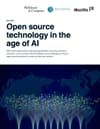What’s Covered
The report dives into how enterprises are integrating open source AI across every layer of their tech stacks—from datasets and models to APIs, hosting, and user applications.
Some key findings:
- Widespread Use: More than 50% of organizations already use open source AI in key areas like models, tools, and data.
- Developer Preference: 81% of developers say experience with open source tools is highly valued in their field, and 66% say it boosts their job satisfaction.
- Cost Advantages: Open source AI is cheaper to implement and maintain, with respondents reporting a 26% average cost improvement over proprietary alternatives.
- Performance Parity Emerging: Open models like Llama 3, DeepSeek-V3, and others are catching up—sometimes outperforming closed models on specific benchmarks.
- Hybrid Future: Most organizations prefer a mixed tech stack—open source where flexibility matters, proprietary where speed and security dominate.
The study also tracks industry and geography trends. Tech sectors and countries like India, the US, and the UK are leading open source adoption. Organizations seeing AI as a strategic advantage are 40% more likely to use open models and tools.
💡 Why it matters?
Open source AI is transforming from a developer curiosity into a strategic pillar for enterprises.
This shift means organizations no longer have to choose between innovation and affordability. But it also means they must handle new risks around security, IP, and compliance.
Understanding where and how open source fits in—and managing its risks—will be critical for responsible, future-proof AI governance strategies.
What’s Missing
The report highlights risks but treats them lightly compared to the potential rewards.
It also doesn’t dive deep into governance models for open source AI beyond technical safeguards (e.g., cybersecurity or third-party audits).
There’s a strong need for more thinking on regulatory harmonization, public oversight, and long-term support structures to ensure open source AI benefits remain sustainable and safe.
Best For
- AI Governance Professionals designing responsible AI procurement or deployment policies.
- Technology Leaders exploring cost-effective, flexible AI architectures.
- Policy Makers interested in the ecosystem impacts of open source AI growth.
- Developers and technical teams advocating for open-first approaches.
Source Details
Title: Open Source Technology in the Age of AI
Authors: McKinsey, Mozilla Foundation, Patrick J. McGovern Foundation
Published: April 2025
Based on: Survey of 703 technology leaders and senior developers across 41 countries.
Full Citation: Open Source Technology in the Age of AI, McKinsey & Company, Mozilla Foundation, Patrick J. McGovern Foundation, April 2025.


